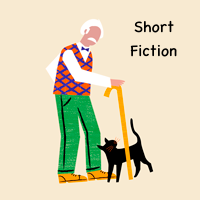The poltergeists come,
one by one,
and they do not know
one another's faces,
only the
...
[+]
With a squeak, the screen door opened from the room next to the kitchen. Ernest turned his head to see Gretchen walk in, her green gardening apron smudged with dark brown soil. On her head was a floral hat with wide brims to block the sun. Ernest scoffed to himself, thinking that when they were young, Gretchen would have been appalled to wear something as gaudy and whimsical as that, but now she wore it proudly on her head. She never used to be the type of person who cared what anyone thought, and Ernest was glad to see that her age was solidifying this coolness with herself. He thought about saying this, but noticing Gretchen's weary body, he said:
"How are the tomatoes coming in?"
He looked at her for a minute before focusing his attention back on the eggs in front of him. Gretchen took her time sitting down. She gripped the kitchen table before slowly lowering herself onto the chair and with a deep sigh, relaxed her body into it
"They're nice dear," she said finally, the exhaustion not present in her voice. In fact, she sounded as lively as ever.
"Soon we'll be able to make bruschetta."
Ernest smiled. It was always the little things that made him happiest and Gretchen was thoughtful. It was a dynamic that he never really got tired of.
Fifty-five years together, and they had run out of things to learn about each other. Gretchen figured she could tell someone Ernest's favorite type of wrench if they asked. Actually, it was the Milwaukee brand adjustable spanner wrench, she thought, remembering the time Ernest had punctured a hole through the wall of their garage with one when he had lost his job in 1976. But now his anger had subsided into a cool lull that only flared occasionally, which Gretchen knew to ignore in a way that would let him settle into the space he needed.
Ernest sometimes glanced at her with both gratitude and shame, remembering a time when he was not a better man, when his anger took hold of him and he was bitter. He was cold. He lashed out on the ones he loved and did silly things like punch holes through garage walls. But Gretchen stayed. She was warm, even when she didn't need to be. When Ernest didn't deserve it. She softened him, chiseled away the parts of him that were mean and dark and not conducive to the man that Gretchen saw underneath it all. He was now the type of person to make eggs in the morning.
"I saw that you made my bed," she said, interrupting his thoughts. "You didn't have to do that, you know that."
He glanced at the couch she was referring to, which was usually strewn with quilts sewn together when Ernest and Gretchen tried to be the type of grandparents to be crafty like that. Now it was just a couch, with room left for guests that sometimes came, but mostly for Ernest and Gretchen to sit and watch the Yankee game or jeopardy. Gretchen often slept on it these days, usually drifting off long before her TV show ended, so the blankets and pillows stayed.
"Well I thought I'd do something nice for you while you were gardening," he said. "I know your hip has been bothering you."
"It has not!" she shot back. "I'm as lean as I was when I was twenty!"
He chuckled and they locked eyes for a moment before settling back into comfortable silence. The eggs still made that sizzling noise. The cat occasionally rolled over in the sunny patch on the floor. It was only broken by the gentle clink of the spatula against the pan as Ernest plated the eggs, with the gentleness of a man who has both outgrown his boyish hurriedness and settled into the patient body of an old man. Slowly, he began to bring the plates to Gretchen, who sat idly, waiting for him.
Arm in arm, the two walked out to their porch, settling into the two wicker chairs that faced their front yard and the street beyond that. They did this every day, eating their breakfast and gazing out at the stretch of road where children rode their bikes, and teenagers drove their parent's cars for the first time with shaky hands. And occasionally lovers walked past, hand in hand, and maybe they waved, remarking that the couple was adorable under their breath as they smiled politely. But they did not know how the two had fought since the day they met to be where they sat. They did not know how they climbed over the rotting bodies of lovers who lost and screamed and beat each other with closed fists or dull ends of frying pans. Or worse, watched as the light faded from each other's eyes until neither of them could come up with any solid emotion for the other besides disgust, the ones who had done everything right and still looked at each other at the end of the day with a hollowness that ached. It was them who had resisted the urge to leave or sink into the calloused shell of themselves and even when they recognized a darkness in each other that seemed too deep to ever crawl out of, somehow, they emerged on top and now they were sitting on the creaky porch, with nothing but a certain happiness that was reserved for each other.
Gretchen noticed how the wind felt cool on her neck, even for a spring day, and Ernest watched as a few people walked by, holding leashes of small dogs. The sun was inching towards the middle of the sky, almost noon. There was absolutely no need to rush now. No need at all.



